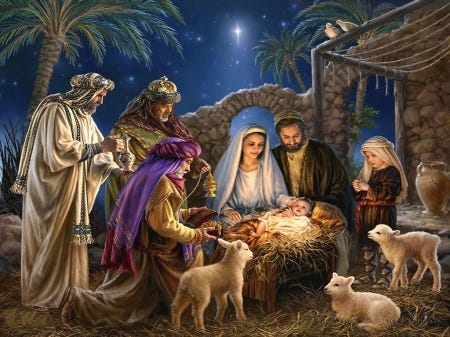
A Reflection for Christmas: God, Truth, and Love
As Christmas rolls around this year, try not to be swept up in the hoopla of consumerism and economic materialism. In our day and age, with the technology of smart phones, hi-speed internet, wi-fi access, iPads, new gaming systems, etc., it is easier than ever to get distracted from God, the truth, and love.
The significance of Christmas, irrespective of the historical origins of its celebration, is the idea that the Second Person of the Trinity invaded the space-time created order and was incarnated as Jesus Christ, a being who is fully man and fully God, through the mystery of the hypostatic union. Jesus was the long-expected Messiah who came to fulfill the Old Testament prophecies. The prophecies included that the Messiah would be born of a woman (Genesis 3:15; Matthew 1:20; Galatians 4:4) who was a virgin (Isaiah 7:14; Matthew 1:22-23; Luke 1:26-31) and that he would be called Immanuel, meaning “God is with us” (Isaiah 7:14; Matthew 1:23). He came to fulfill these and many other important prophecies.
In a time where we find people unthinkingly expressing their belief in moral and religious relativism, it is important to focus on the truth. Christmas is such an opportunity. Moral and religious relativism is self-defeating since, to communicate and reason, we always assume that what we are saying and hearing is intelligible; otherwise, no communication would be possible. Mere intelligibility suggests that there is a correspondence between the transmitter and the receiver. The message itself may be distorted through the process of communication, but the fact that there is a message to be discerned is not in dispute. This assumes truth through our capabilities of discernment. If this were not the case, nothing would make sense at all. The other thing to note is that relativists typically consider themselves to be progressive, but under such a view, there cannot be any progress since there is no standard to measure what is better or worse. Moral and religious relativists, so to speak, have two feet firmly planted in mid-air.
The Prologue to the Gospel of John proclaims that the Word (the second person of the Trinity) became flesh: “In the beginning was the Word, and the Word was with God, and the Word was God. He was with God in the beginning” (John 1:1–2). This is a profound statement of truth since the Word is the Greek term for “logos,” which in theology signifies divine reason. This is where logic and truth come from. The order of the universe is communicated through God’s speech. Not only does God embody reason and truth, but truth is also enshrouded in love, as 1 John 4:16 states: “And so we know and rely on the love God has for us. God is love. Whoever lives in love lives in God, and God in them.” It is this very love that is dispersed to all of us through God’s ultimate acts of love: creation, the Incarnation, Jesus’ self-sacrifice for our redemption, and the promise of our future resurrection. As Jesus commands: “A new command I give you: love one another. As I have loved you, so you must love one another. By this everyone will know that you are my disciples, if you love one another” (John 13:34–35). The rest of the world will know us by the fruit of our love—not only how we love our family and neighbours but also our enemies who persecute us. This Christmas, remember to fix your eyes on God, who is truth and love, which propels us to be witnesses to the gospel. Thus, charity in a time like this is vital, but as George Michael recognised in his song “Praying for Time,” we should not let it be a “coat” that is worn only twice a year. It should be demonstrated and carried forth every day in whatever way possible. So, this Christmas season, be witnesses to truth, love, and God! A Merry Christmas to all!


